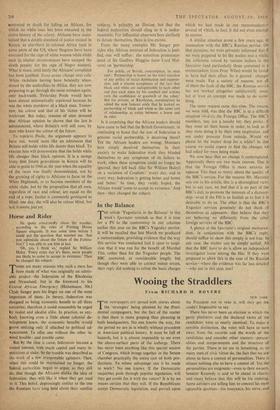Horse and Rider
He spoke concernedly about the weather, according to the rules of Printing House Square etiquette. It was some time before I could put the question that worried me. 'Are you optimistic about the future of the Federa- tion?' I was able to ask him at last.
'Oh, yes, I think so,' replied Sir William Haley. 'Every extra day it's there, more people are likely to come to accept its existence.' Then he changed the subject.-
THERE are many reasons why such a mess has been made of what was originally an admir- able project—the federation of the Rhodesias and Nyasaland; but in the foreword to his Central African Emergency (Heinemann, 30s.) Clyde Sanger puts his finger on one of the most important of them. In theory, federation was designed to bring economic benefit to all three countries; therefore it could reasonably be urged by realist and idealist alike. In practice, as any- body knowing even a little about colonial de- velopment knew, the economic benefits would prove enticing only if attached to political ad- vancement. To offer one without the other in- Vited trouble: and trouble came.
But by the time it came, federation became a vested interest, with much capital and many re- putations at stake. So the trouble was described as the work of a few irresponsible agitators. Then, when this could be maintained no longer, the federal authorities began to argue, as they still do, that though the Africans dislike the idea of federation, they will like it when they get used to it. This belief, depressingly similar to the one the Russians have long held about their satellite subjects, is palpably an illusion; but that the federal authorities should cling to it is under- standable. For influential-observers here similarly to delude themselves, there is less excuse.
From the many examples Mr. Sanger pro- vides why African mistrust of federation is justi- fied, one will suffice: the notorious pronounce- ment of Sir Godfrey Huggins (now Lord Mal- vern) on 'partnership.'
For public, or British, consumption, he once said: 'Partnership is based on the total rejection of any policy of racial domination and suppres- sion, and a sincere acceptance of the fact that black and white are indispensable to each other and that each must by his conduct and actions earn the confidence or goodwill of the other.' But for private, or Rhodesian, consumption he added the now famous aside that he looked on partnership of black and white as the same sort of relationship as exists between a horse and its rider.
Is it surprising that the African leaders should have come to feel that the British Government. it continuing to boast that the aim of federation is genuine racial partnership, is deceiving them? Yet the African leaders are wrong; Ministers here simply deceived themselves. In their anxiety to make federation Work they blinded themselves to any symptoms of its failure to work; when these symptoms could no longer be ignored, they fell back (like Sir William Haley) on a variation of Coudism: 'every day, and in every way, federation is getting better and better and better.' In time, they vainly hoped, the African would 'come to accept its existence.' And then—they changed the subject.


































 Previous page
Previous page